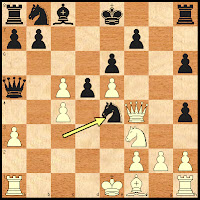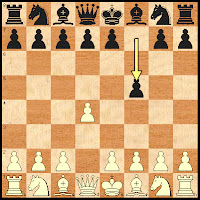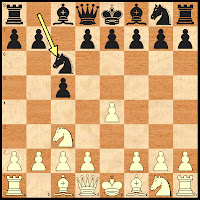J.Anders–D.Young
RVCCA Scholastic Club Championship Game
Arcadia Books and Café, Spring Green, WI.
August 11th, 2011
Time Control: G/45 +5
[KP (B00), Nimzovich defence]
1.e4 Nc6 2.Nf3
[KP (B00), Nimzovich defence]
2…e5 3.Nc3 a6 4.d3 d6 5.Bg5 Nce7 6.d4 d5 7.Nxe5 Nf6 8.Be2 dxe4 9.Bxf6 gxf6 10.Bh5 Nc6 11.Bxf7+ Ke7 12.Qg4 Bxg4 13.Nxg4 [13.Nd5+ cannot change destiny 13...Kd6 14.Nxg4 f5-+ ]
13...Nxd4
[Better is: 13...Kxf7 keeps an even firmer grip 14.d5 Nb4 15.Ne3-+ ]
14.Bc4
[14.Bb3 otherwise it's curtains at once 14...Nxb3 15.axb3-+ ]
14...Nxc2+ 15.Kf1
Actual move played was 15.d1, an illegal move. Available moves are 15.Ke2 and 15.Kf1. 15.Kf1 is played here in lieu of the illegal move (does not affect play).
15...Nxa1 16.Ke2 Nb3!
[Mate threat]
17.axb3 [17.axb3 c6 Combination; 17.Bxb3 Qd3+ 18.Ke1 Kd8 Combination; With the idea: 17.-- Qd2+ Mate threat]
17...a5
[Better is: 17...f5 secures the point 18.Rd1 Qb8 19.Nd5+ Kd8 20.Nde3+ Bd6 21.Nxf5-+ ]
18.Nd5+
[18.Rd1 doesn't do any good 18...Qb8 19.Nd5+ Kd8 20.Ndxf6+ Bd6 21.Nxe4 Ke7-+ ]
18...Ke8
[18...Kd6 keeps an even firmer grip 19.Rd1 Kc6 20.Ndxf6-+ ]
19.Ngxf6+
[19.Ndxf6+ is still a small chance 19...Ke7 20.Rd1 Qxd1+ 21.Kxd1 Rd8+ 22.Ke2-+ ]
19...Kf7 20.Nxe4
[20.Rd1 doesn't change anything anymore 20...Kg7 21.Nf4 Qc8-+ ]
20...a4
[20...b5 21.Bxb5 Bh6 22.Ndf6-+ ]
21.Ng5+
[21.Nxc7+ cannot change what is in store for ? 21...Kg6 22.Nxa8 Qxa8 23.bxa4 Qxa4-+ ]
21...Ke8
[21...Qxg5 22.Nxc7+ Kg6 23.Nxa8 Qg4+ 24.Kd3 Qf5+ 25.Kc3 Bg7+ 26.Kb4 Rxa8 27.Ka3 Qc5+ 28.Ka2 axb3+ 29.Kxb3 Qb6+ 30.Kc2 Qxf2+ 31.Kd3 Rd8+ 32.Bd5 Rxd5+ 33.Kc4 Qc2+ 34.Kxd5 Qc6# ]
22.Ne4 [22.Ne6 doesn't improve anything 22...Qc8 23.Ndxc7+ Kd7 24.Rd1+ Bd6 25.Nxa8 Qxa8-+ ]
22...a3
[Better is: 22...Bg7 seems even better 23.Rd1 Qb8 24.bxa4-+ ]
23.g4
[23.Rd1 doesn't change the outcome of the game 23...Bd6 24.bxa3 Rxa3 25.Nxc7+ Qxc7 26.Rxd6 Ra2+ 27.Ke3 Qa5-+ ]
23...a2
[Better is: 23...axb2 might be the shorter path 24.Rd1 Bd6 25.g5-+ ]
24.g5 Bg7
[Better is: 24...a1Q keeps an even firmer grip 25.Nef6+ Kf7 26.Nxc7+ Ke7 27.Ncd5+ Kd6 28.Rxa1 Rxa1 29.Kf3-+ ]
25.Ra1 Bxb2 26.Rxa2 Rxa2 27.Ke3 Bg7 28.h4 Ra5 29.f4 Rxd5 30.Bxd5 Qxd5 31.h5 Bd4+
[31...Qd4+ 32.Kf3 Qd3+ 33.Kg2 Qxe4+ 34.Kh3 Qf3+ 35.Kh2 Qxf4+ 36.Kh3 Qf3+ 37.Kh2 Rf8 38.h6 Be5+ 39.Kg1 Qf1# ]
32.Kf3 Bg7 33.h6 Bf8 34.Ke3 Qxb3+ 35.Kd4 Qb6+ 36.Ke5 c6 [36...Bd6+ 37.Kd5 Qb3+ 38.Kd4 c5+ 39.Nxc5 Qb4+ 40.Kd3 Qxc5 41.g6 hxg6 42.Ke4 Qc4+ 43.Ke3 Rxh6 44.Kf2 Qe4 45.Kg3 Qxf4+ 46.Kg2 Rh1 47.Kxh1 Qh2# ]
37.Nf6+ Kf7 38.Nd7 Qc7+ [38...Qe3+ 39.Kf5 Qe6# ]
39.Kf5 Qxd7+ 40.Ke4 b5
[40...Qd5+ 41.Ke3 Bc5+ 42.Ke2 Re8+ 43.Kf1 Qf3# ]
41.f5 b4 42.g6+ Ke8
[42...hxg6 43.fxg6+ Kxg6 44.Ke3 Bxh6+ 45.Kf2 Qg4 46.Kf1 Be3 47.Ke1 Rh1# ]
43.g7 b3
[43...Qd5+ 44.Kf4 Bd6+ 45.Kg5 Qd2+ 46.Kh5 Qh2+ 47.Kg4 Qf4+ 48.Kh5 Qf3+ 49.Kg5 Be7+ 50.f6 Bxf6# ]
44.gxh8Q b2!
Mate threat
45.Qe5+
[45.Qxb2 Qd5+ 46.Ke3 (46.Kf4 Qc4+ Double attack (46...Bd6+ Deflection; 46...Bxh6+ Zwischenzug) ) 46...Qc5+ Double attack (46...Qxf5 Deflection; 46...Bxh6+ Zwischenzug) ; With the idea: 45.-- b1Q+ Mate threat]
45...Kd8
[45...Qe7 46.Kd4 b1Q 47.Qe6 Qd1+ 48.Kc3 Qxe6 49.fxe6 Bc5 50.e7 Kxe7 51.Kb2 Bb4 52.Ka2 Qc2+ 53.Ka1 Bc3# ]
46.Qf6+
[46.Qb8+ doesn't get the bull off the ice 46...Ke7 47.f6+ Kf7 48.Qxb2 Qd5+ 49.Kf4 Bxh6+ 50.Kg4 Qe4+ 51.Kg3 Bf4+ 52.Kf2 Qe3+ 53.Kg2 Qg3+ 54.Kf1 Qh3+ 55.Qg2 Qxg2+ 56.Kxg2 Kxf6-+ ]
46...Be7
[46...Qe7+ 47.Qxe7+ Bxe7 48.f6 b1Q+ 49.Ke3 Bxf6 50.Ke2 Qe4+ 51.Kf2 Be5 52.Kf1 Qc2 53.Ke1 Bg3+ 54.Kf1 Qf2# ]
47.Qh8+
[47.Qxb2 hoping against hope 47...Qd5+ 48.Kf4 Qd6+ 49.Ke4 Qxh6 50.Qb8+ Kd7 51.Qa7+ Ke8 52.Qa5-+ ]
47...Kc7
[Better is: 47...Qe8 secures the win 48.Qxe8+ Kxe8-+ ]
48.Qxb2 Qe6+
[48...Qd5+ 49.Kf4 Qc4+ 50.Kf3 Qd3+ 51.Kg2 Qe4+ 52.Kg1 Bc5+ 53.Kh2 Qh4+ 54.Kg2 Qg4+ 55.Kf1 Qg1+ 56.Ke2 Qf2+ 57.Kd3 Qxb2-+ ]
49.fxe6+- Bd8 50.Qa3
[50.Qg7+!? might be the shorter path 50...Kb8 51.Qxh7 Bh4+- ]
50...Kb6 51.e7 Bxe7 52.Qxe7
Black tries to resign in acceptance that he cannot win; he is persuaded to try for a stalemate.
52...c5 53.Qxh7 c4 54.Kd4 Kb5 55.Qb7+ Ka5 56.h7
[56.Kxc4 Ka4 57.Qb4# ]
56...Ka4
Black incorrectly makes two moves in a row after some kibitzing and moves 56(2)...a3. This move is omitted as it does not change play.
57.h8=Q c3 58.Qha8#
White Mates
1-0
Annotation by Taylor Scott
DOWNLOAD .PGN
_________________________________________________________
M.Rohe–T.Scott
RVCCA Championship Game
Arcadia Books and Café, Spring Green, WI.
August 4th, 2011
Time Control: G/60 +5
[Dutch (A80)]
1.d4 f5
[Dutch (A80)]
The Dutch Defense surprised White, who was expecting the Queen's Gambit Accepted from Black. White had never faced this defense before & neither had he studied it. Kudos to Black for coming up with an unexpected opening; throwing White off his game.
2.e3 e6 3.c4 Nf6 4.Nc3 Be7 5.Bd3 b6 6.Qf3 Nc6= 7.d5
[White threatens to win material: d5xc6 {7.Qd1 Bb7 8.Nf3 Nb4=}]
Not a strong move, and not in line with the style White usually plays. Although it seems to be aggressive, it actually leads White into a passive position.
[Black threatens to win material: Nb4xd3 {7...Ne5 8.Qe2=/+}]
8.Bb1= Bb7 9.a3
[White threatens to win material: a3xb4 ]
9...Na6 10.Qe2
[10.b4= ]
White was looking at a potential tactic on the knight on a6, but it would have been better to simply develop.
[10...Nc5!? might be a viable alternative 11.Qd1 0-0=/+ ]
11.dxc6
[11.Nf3 exd5 12.Bxf5 Nc7+/= ]
11...Bxc6= 12.Nf3 0-0 13.0-0 Nc5 14.Bc2 Nfe4 15.Nxe4 Nxe4 16.Ne5
Nd4 may have been the better square to attack the bishop from.
16…Rc8
The bishop was a strong piece, so Black likely would have been better off moving at back rather than allow White to exchange it.
17.Nxc6 Rxc6 [White has the pair of bishops]
18.Qf3
[18.Ba4!? Rc7 19.Bb3= ]
White goes into a funk and plays several inferior moves over the next sequence. f3 driving away the knight is stronger and keeps the game relatively even.
[Better is: 19.Bd3 is the best chance 19...Ng5 20.Qe2=/+ ]
Blundering a piece. Qe2, protecting the bishop; attacking the rook was a better move here. As stated above, White should never have moved the queen from e2 in the first place.
19...Rxc2-+ 20.Qd1 Bf6 [Better is: 20...Qc7 and Black can already relax 21.f3 Nf6 22.Bd2-+ ]
21.Rb1
[21.Qxc2 cannot change what is in store for ? 21...Bxa1 22.f3 Nc3-+ ]
21...Rc6
[Better is: 21...Ra2 might be the shorter path 22.Qd3 Be5 23.f4-+ ]
Being down in material, White did not want to trade off pieces, but that was a mistake in this situation.
22.b4
[22.Bb2-+ what else?]
Another blunder, as this allows a knight fork; black the loss of the exchange (rook for knight).
22...Nc3 23.Qc2 [23.Qd3 doesn't change the outcome of the game 23...Nxb1 24.b5 Rc5 25.Qxb1 Qb8-+ ]
23...Nxb1 24.Qxb1 Be5
[24...Qc7 keeps an even firmer grip 25.Bd2 Rc2 26.Be1-+ ]
25.Re1
[25.Bb2 is no salvation 25...Bxb2 26.Qxb2 Qc7-+ ]
Although White does not want to exchange pieces, he should again strongly consider Bb2, since his dark squared bishop is a weak piece, and Black's counterpart is stronger.
25...Qh4
[Better is: 25...Qc7!? seems even better 26.Bd2 Bxh2+ 27.Kf1-+ ]
26.g3 Qh3
The next several moves feature a lot maneuvering - Black looks to bring an attack on White's king & White first tries to set up defense; then tries to create counterplay.
27.Qd3 [27.Bb2 doesn't get the cat off the tree 27...Bxb2 28.Qxb2 Rfc8-+ ]
27...d5
[Better is: 27...Rfc8 secures the point 28.Qd1 Rxc1 29.Qxc1 Rxc1 30.Rxc1-+ ]
28.f4
[28.Bd2 doesn't change anything anymore 28...Rfc8-+ ]
28...Bc3 29.Rf1
[29.b5 does not improve anything 29...Rc5 30.Qf1 Qg4-+ ]
29...Rf6
[29...Rfc8 30.Qd1 Bxb4 31.axb4 Qxf1+ 32.Kxf1 Rxc1 33.Qxc1 Rxc1+ 34.Ke2 a5 35.bxa5 bxa5 36.e4 fxe4 37.f5 Rc8 38.fxe6 a4 39.Ke3 a3 40.e7 a2 41.Kf4 a1Q 42.Kg4 Qf6 43.Kh3 Qf5+ 44.Kh4 g5+ 45.Kh5 Re8 46.h4 g4+ 47.Kh6 Qg6# ]
30.Qe2 d4 31.Qb5
[31.b5 doesn't do any good 31...Rc5-+ ]
31...Rh6 32.Rf2 Rc8 33.Qd7
[33.Rc2 a fruitless try to alter the course of the game 33...Qh5 34.Qf1 Rd8-+ ]
33...Rf8
White has successfully achieved getting his queen to a threatening position. Black still has a lot of pieces around White's king, but White is secure for the time being.
34.exd4
[34.Qc6 cannot change destiny 34...Qh5 35.h4 Rg6-+ ]
34...Be1 35.Rg2 Bxg3!
[Decoy: g3 ]
36.Kf1
[36.Rxg3 Qxh2+ Decoy Double attack; 36.hxg3 Qh1+ Skewer; With the idea: 36.-- Bxh2+ Wins material]
White sets a desperation trap and prays for a major oversight.
36...Bxh2 [36...Qh5 37.hxg3 Qh1+ 38.Kf2 Qxc1 39.Kf3 Qc3+ 40.Kf2 Rc8 41.Qxc8+ Qxc8 42.d5 Rh1 43.Rg1 Qc2+ 44.Ke3 Rxg1 45.Kd4 Rd1+ 46.Ke5 Rxd5+ 47.Kxe6 Qe4# ]
White's prayers are answered... Black was up by +8 (by tChess analysis) before this move & appeared to have the game well in hand.
37.Qxg7#
White Mates
Black had significantly outplayed White for most of this game, but his only blunder lost the game instantly.
















































